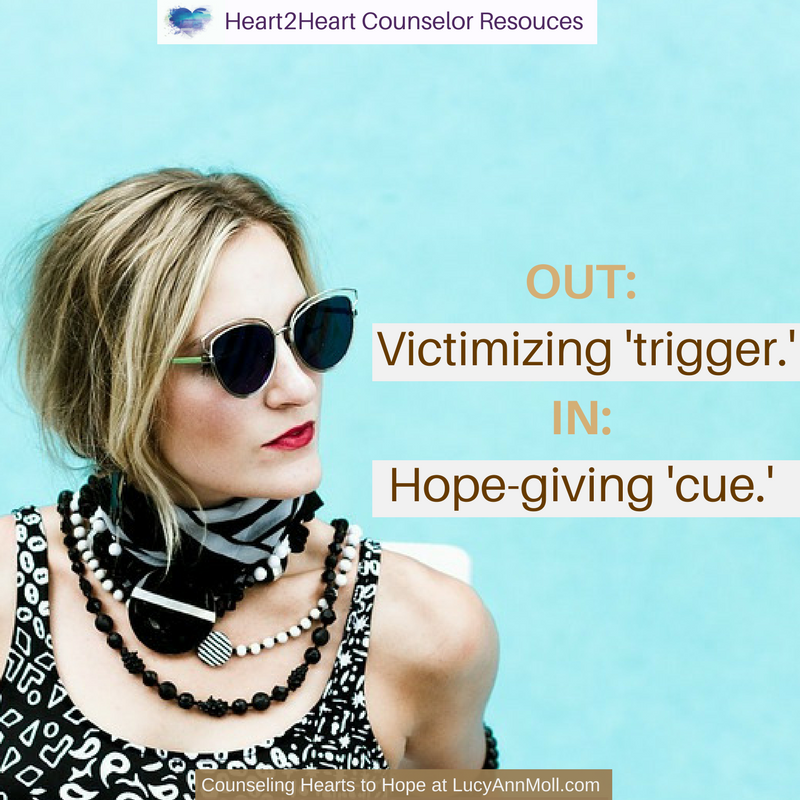TRIGGERS: Help When Triggers Trouble a Loved One
 Triggers: Often counselees speak of triggers, whether or not they have post-traumatic stress. It’s a societal buzzword. So what are triggers? How does the Bible term them? And what can you help your friend, counselee, or yourself handle them? The guest post by Andrea Lee whose article appeared first here on The Biblical Counseling Coalition website and is used with permission.
Triggers: Often counselees speak of triggers, whether or not they have post-traumatic stress. It’s a societal buzzword. So what are triggers? How does the Bible term them? And what can you help your friend, counselee, or yourself handle them? The guest post by Andrea Lee whose article appeared first here on The Biblical Counseling Coalition website and is used with permission.

As a biblical counselor, I often hear about “triggers.” These are situations, locations, words, and people that remind counselees of past pain or current heartache. These triggers threaten to engulf counselees in an avalanche of despair, anger, or anxiety. What is a trigger and how can a biblical counselor engage with people who seem to be subject to them?
Counselees view a trigger as an event or circumstance that is the cause of a particular response or emotional process Click & Tweet! . As a counselor to women, here are some situations I have encountered:
- It could be a mom who identifies her rambunctious toddler as a “trigger” – one energetic outburst and the mom is overwhelmed with exhaustion and despair.
- It could be a wife whose husband’s typical response in conflict is a “trigger”- one phrase or condescending look and the wife is flooded with anger or hopelessness.
- Or it could be a young single woman who sees Friday nights as a “trigger” – she has been alone and miserable for many Fridays and now dreads the end of every week.
In seeking to help these women, I explain to them that triggers do not cause their response. The so-called “trigger” is a reminder that tempts them toward a well-worn destructive thought pattern. Click & Tweet! The reminder is often associated with pain: previous failures, past hurts, or current broken relationships. Women feel helpless because they don’t know how to stop responding in a destructive way. I love to give hope by showing a new perspective on these moments.
When we label someone or something a “trigger,” we shift the place of emotional control from our own heart to an external object. The connection between event and emotion can mistakenly lead us to think the trigger is a cause. Actually, we have developed habits of thoughts in response to pain that continue to lead to these predictable emotional conditions. Our despair, anxiety, and anger reveal that we are ignoring God and disregarding His promises as we respond to the brokenness around us or in us. Instead of thinking in terms of triggers, I want counselees to see certain situations and people as cues – signals, prompts, and reminders – to begin a series of thoughts that are radically God-oriented. This shift in vocabulary begins to engage counselees in a process of repentance and trust when they are troubled by triggers.
So how do we move from the victimizing idea of a trigger to the hope-giving idea of a cue? Consider the following steps: Click & Tweet!
Step 1: Recognize the triggers and the accompanying thinking
Women often know what launches them into a familiar path of pain. But here are questions that can help:
- What was the stimulus that began this descent into despair, anxiety, or anger?
- When do I have a disproportionate reaction to a situation or a person?
- Are others puzzled by the intensity of my response or mood swing?
Once the triggers are identified, it is vital to have the counselee write down their exact thoughts. You will probably hear some of these in the counseling room. For example:
- I can’t believe this is happening again. I can’t take it anymore. What if this never gets better?
- I’m stuck. Nothing ever changes. It’s unfixable. I’ll never change.
- Also I can’t breathe. I have to do something right now. I can’t stand the pressure.
If your trigger is related to an experience of sexual and/or physical abuse, please seek further help from a biblical counselor. You will also want to explore In the Aftermath, by Pam Gannon and Beverly Moore and Putting the Past in Its Place, by Steve Viars. If you are struggling with triggers associated with PTSD, Greg Gifford’s book, Helping Your Family Through PTSD, is a valuable resource.
Step 2: Repent by evaluating three categories
 God is gracious to help us identify triggers. It is a gift because it alerts us to repent in specific, concrete areas. Since repentance is the key to change, this gives us hope.[1] Repetitive elements in the counselee’s thinking will reveal weaknesses in theology and worship. Counselees often minimize or ignore God’s goodness, God’s presence, and God’s perfect ways.
God is gracious to help us identify triggers. It is a gift because it alerts us to repent in specific, concrete areas. Since repentance is the key to change, this gives us hope.[1] Repetitive elements in the counselee’s thinking will reveal weaknesses in theology and worship. Counselees often minimize or ignore God’s goodness, God’s presence, and God’s perfect ways.
Psalm 40:1-3 is a great passage to address these areas of unbelief.
- God IS good: “As for you, O Lord, you will not restrain your mercy from me; your steadfast love and your faithfulness will ever preserve me!”
- God IS present: “As for me, I am poor and needy, but the Lord takes thought for me. You are my help and my deliverer; do not delay, O my God!”
- And God IS working: “He inclined to me and heard my cry. He drew me up from the pit of destruction…He put a new song in my mouth”
The Psalmist doesn’t believe these things because he has a perfect past or a blameless record (see Psa. 40:12), but because God gives salvation out of His great mercy in Jesus Christ.
A prayer of repentance may sound something like this:
- Lord, this thought process reveals that I am not believing the truth about who you are. Please forgive me for going astray after a lie (Ps. 40:4).
- My thinking has become futile because I am not honoring you or thanking you (Rom. 1:21).
- I am in a pit of destruction and a miry bog of my own making when I continue to think hopeless, godless thoughts (Ps 40:2-3).
- Instead of spinning into despair and anxiety, help me to wait patiently for you and keep crying out to you. Thank you for your forgiveness and help.
Step 3: Mobilize your cue
Finally, help counselees prepare specific thoughts they will embrace the next time a trigger comes. Identify one thought that most fuels the downward cycle and prepare a God-honoring thought that will replace it. Develop simple statements that can be easily memorized and repeated. When they experience a trigger, the counselee should:
-
Engage in gratitude:
- Thank God for this opportunity to worship Him and to be changed.
- Thank Him for the reminder that we all need a Savior and God has provided one.
- And thank God for the reminder of past sin or hurt because it humbles us and pushes us to know Christ better
-
Embrace a promise:
- God’s grace is up to the challenge.[2]
- God will give me all the grace and strength I need to obey Him (1 Cor. 10:13, 2 Cor. 9:8).
- Also God hears my cries; He is working and He is good (Ps. 40).
There is great joy and hope in moving from trigger to cue by specific repentance and obedience. As you help counselees to recognize, repent, and then prepare for specific situations, you are equipping them to worship God and love others with greater wisdom and diligence. Painful reminders in life can be a cue to trust God by remembering and rehearsing His goodness, His presence, and His perfect ways.
Questions for Reflection
What triggers trouble your counselees? What thoughts fuel the negative spiral? And what cues have you mobilized in your counseling that have been particularly effective?
[1] Heath Lambert, “Die to Self and Grow in Love,” (presentation, Association of Certified Biblical Counselors Annual Conference, 2013; https://biblicalcounseling.com/product/die-to-self-and-grow-in-love-heath-lambert-2/)
[2] Kevin Carson, “Five Favorite Passages in Biblical Counseling” (presentation, Biblical Counseling and Discipleship Training, Atlanta, GA, Jan. 27, 2018).
About Andrea Lee
Andrea Lee lives in Atlanta, Georgia with her husband of 11 years. She serves women in the church and community as a biblical counselor.





